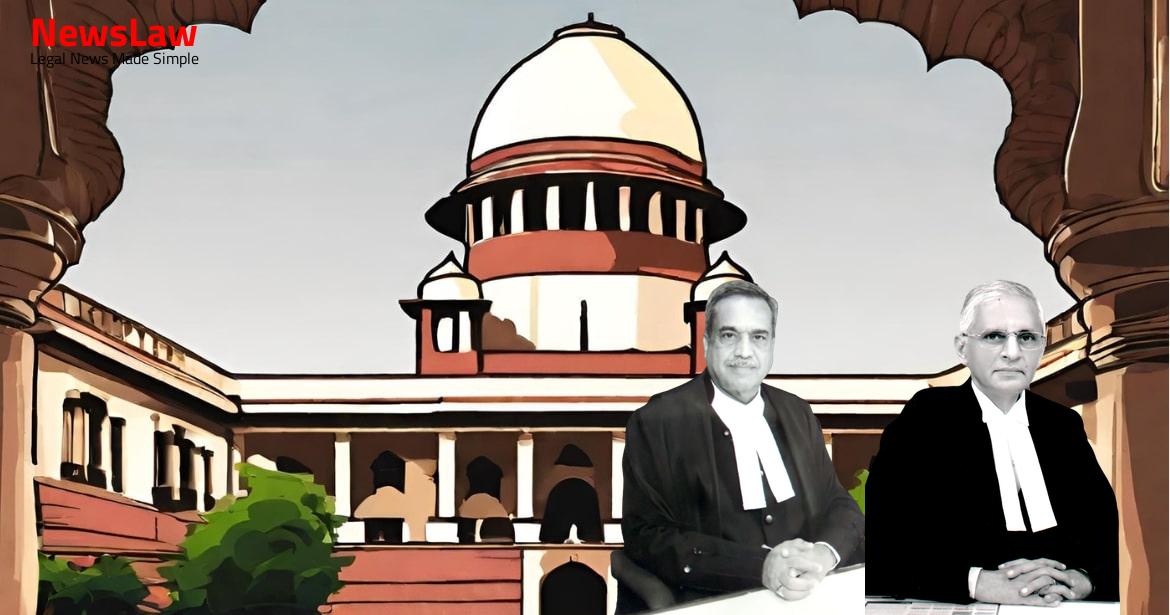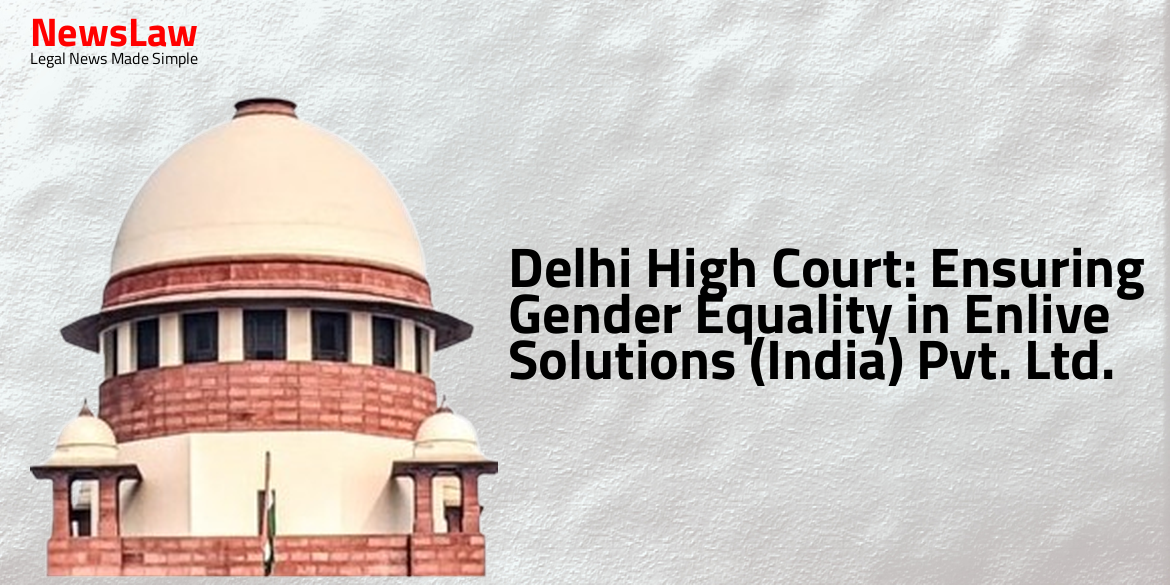The legal case delves deep into the intricacies of differentiating between resignation and voluntary retirement in the context of Pension Regulations. The court’s meticulous examination of the eligibility criteria and consequences of the respondent’s application provides valuable insights into the application of pension laws.
Facts
- The learned Tribunal disposed of the transfer application by directing the appellants to process the respondent’s claim for terminal/pensionary benefits with 15 years of qualifying service as a late entrant under Regulation 15 of the Pension Regulations.
- The appellants – Union of India and another, filed a statutory appeal against the decision of the Tribunal.
- The respondent commissioned in the Indian Army as a Short Service Commission Officer on 27.03.1992 at the age of 33 years and 10 months.
- The leave to appeal was also dismissed by the Tribunal on 25.03.2019.
- The respondent applied for resignation on the grounds of lack of promotional prospects in a letter dated 15.04.2000.
- His statutory complaint against the rejection of his resignation was rejected on 14.03.2002 by the Under Secretary, Government of India.
- The respondent filed a writ petition in the High Court of Jammu & Kashmir against the rejection of his complaint and it was allowed on 11.10.2006, directing the Army to reconsider the resignation.
- The respondent voluntarily applied for Permanent Commission on 7.8.1997 and was granted Permanent Commission at the age of 39 years and 2 months on 28.01.1998.
- The respondent became a Graded Specialist on 1.6.1994 and a Classified Specialist on 1.6.1999.
- The application for resignation was initially rejected by the DG, Medical Services (Army) on 4.9.2000.
- The respondent’s resignation was later accepted on 31.01.2007, albeit without entitlement to terminal benefits except for leave encashment.
- The respondent’s name was removed from the Army Medical Corps on 22.04.2007, with effect from 23.04.2007.
Also Read: Judicial Review of Delayed Writ Petition
Issue
- Key issue: Whether the respondent is entitled to pension benefits as a late entrant under Pension Regulations, 1961.
- The primary question is if the respondent qualifies as a late entrant under Regulation 15 of Pension Regulations, 1961.
- A secondary question arises regarding the nature of the respondent’s resignation on 15.04.2000 – whether it should be considered a resignation or voluntary retirement.
Also Read: Ownership Dispute: Legal Analysis on Admission and Decree
Arguments
- The Appellant vehemently argues that the respondent’s claim for terminal/pensionary benefits should not be considered as that of a ‘late entrant’ under Regulation 15 of the Pension Regulations.
- It is emphasized that the respondent’s submission for ‘voluntary retirement’ was in fact a case of ‘voluntary resignation’ due to lack of promotional prospects.
- The Appellant contests that the respondent’s resignation application on 15.04.2000 did not meet the eligibility criteria for premature retirement, reinforcing the argument of ‘voluntary resignation’.
- Distinguishing between ‘voluntary resignation’ and ‘voluntary retirement’, the Appellant claims that the Pension Regulations 2008 should not apply as the respondent resigned in 2000 and was struck off from the Army Medical Corps in 2007, making the Pension Regulations 1961 applicable.
- It is asserted that there was no delay in the decision-making process regarding the respondent’s resignation application, as it was rejected on 4.9.2000, and the statutory complaint filed by the respondent was in 2001.
- The Appellant argues that the respondent, by resigning, was not eligible for the benefits under Regulation 15 or any terminal benefits as per the applicable Regulations/Rules.
- Lastly, it is contended that the respondent did not fulfill the criteria for being considered a ‘late entrant’ and therefore should not be entitled to the benefits under Regulation 15 of the Pension Regulations.
- Respondent’s real intention was to seek premature retirement but was told he had less than 10 years of service, so his application was treated as one of resignation.
- Army HQ Policy dated 26.03.1998 stipulates that premature release before 10 years of service has to be termed as ‘resignation’ and not as ‘premature retirement’.
- Respondent’s application was treated as ‘resignation’ due to technical reasons, even though he had no intention to resign and lose service benefits.
- Court held that the policy denying pension and benefits to those who resigned was contrary to Pension Regulations.
- Respondent submitted application on a form with options for ‘resignation’ and ‘premature retirement’.
Also Read: Interpretation of Statutory Limitation under Section 263(2)
Analysis
- The respondent’s resignation was accepted on 31.01.2007, prior to the Pension Regulations of the Army, 2008 coming into force.
- The respondent’s application for resignation in 2000 was treated as such by the High Court and was not considered as a request for voluntary retirement.
- Regulation 15 defines a ‘late entrant’ as an officer with at least 15 years commissioned service but less than 20 years total qualifying service, entitling them to pensionary benefits.
- The respondent’s application for resignation was due to lack of promotional prospects and ineligibility for technical skill acquisition.
- The respondent’s attempt to reclassify his 2000 resignation as a request for voluntary retirement was not accepted due to eligibility criteria not being met at that time.
- The respondent did not complete the required 20 years of service for retiring pension, but could be classified as a ‘late entrant’ with at least 15 years of service.
- The respondent’s reliance on Pension Regulations of the Army, 2008 was not applicable as he is governed by Pension Regulations, 1961.
- Various distinctions between resignation and voluntary retirement were noted, including eligibility criteria, timing, and consequences.
- The High Court’s judgment on the respondent’s resignation noted lack of promotional prospects as a reason.
- Pension schemes cannot be expanded by implication, and the express terms of the provisions must be followed.
- The distinction between ‘resignation’ and ‘voluntary retirement’ was considered in the case of Senior Divisional Manager, LIC v. Shree Lal Meena and subsequently followed in BSES Yamuna Power Ltd.
- The principles for the controversy were well enunciated in the judgment of RBI v. Cecil Dennis Solomon where the officer completed the requisite qualifying service for pensionable benefits.
- Employees who had resigned earlier sought applicability of Pension Regulations to themselves.
- Respondent cannot be considered a ‘late entrant’
- Respondent is entitled to the benefit of Regulation 15
- Respondent is entitled to pensionary benefits
Decision
- The impugned judgment and order passed by the Armed Forces Tribunal on 9.2.2018 in T.A. No 25/2017 quashing and setting aside para 2 of letter dated 31.01.2007 denying terminal/pensionary benefits to the respondent
- The Tribunal directed the appellants to process the respondent’s claim for terminal/pensionary benefits taking his qualifying service as 15 years as a late entrant in accordance with Regulation 15 of the Pension Regulations
- The quashed order denying the respondent terminal/pensionary benefits as a late entrant is overturned, stating the respondent is not entitled to the benefits as a late entrant under Regulation 15 of the Pension Regulations
- The appeal is allowed with no order as to costs
Case Title: UNION OF INDIA Vs. ABHIRAM VERMA (2021 INSC 585)
Case Number: C.A. No.-001027 / 2020



